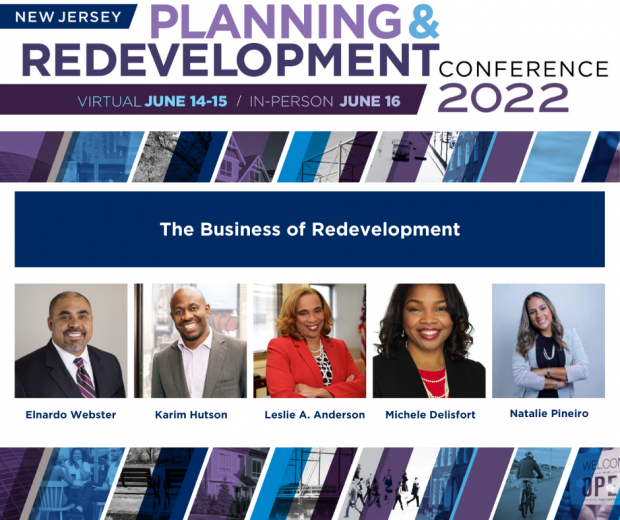New Jersey Future Blog
Centering Small Business in Post-Pandemic Redevelopment
July 7th, 2022 by Hannah Reynolds
 “Think about culture [and] what curating a downtown really means,” invited Natalie Pineiro, executive director of the Downtown Somerville Alliance, at the 2022 NJ Planning and Redevelopment Conference, hosted by New Jersey Future and the New Jersey chapter of the American Planning Association. Pineiro’s comment implored viewers of the breakout session, The Business of Redevelopment, to consider the importance of including diverse voices in planning for downtown revitalization and redevelopment of communities, especially small business owners and community members.
“Think about culture [and] what curating a downtown really means,” invited Natalie Pineiro, executive director of the Downtown Somerville Alliance, at the 2022 NJ Planning and Redevelopment Conference, hosted by New Jersey Future and the New Jersey chapter of the American Planning Association. Pineiro’s comment implored viewers of the breakout session, The Business of Redevelopment, to consider the importance of including diverse voices in planning for downtown revitalization and redevelopment of communities, especially small business owners and community members.
The panel, hosted by Leslie Anderson, the President and CEO of the New Jersey Redevelopment Authority, featured a lineup of four impressive speakers including Pineiro; Elnardo Webster, partner at Inglesino, Webster, Wyciskala, & Taylor, LLC; Karim Hutson,
founder and managing member of Genesis Companies; and Michele Delisfort, principal and managing partner of Nishuane Group, LLC and mayor of Union Township. Throughout the session, all four speakers highlighted the disconnect between profit-driven developers and small business owners lacking the financial resources to pay rent in downtown communities. Repeatedly, the panelists referred to the lack of a ‘universal language’ when it comes to communicating across stakeholder groups: landlords and developers, community members and customers, small business owners, and municipal leaders.
Michele Delisfort, of Nishuane Group, explained that—in her experience with public planning pre- and post-COVID-19—the pandemic shifted relationships between developers, municipalities, and small businesses. In the past, the triparty relationships were often adversarial in nature; the pandemic necessitated greater flexibility as municipal governments sought to work with developers to increase accessibility of rent and to develop and revitalize their communities by encouraging walkable streets and an abundance of small businesses in the downtown areas. In navigating these sometimes contentious collaborations, Delisfort insisted that town leadership had to be flexible and community-driven, with a deep understanding of where the community is in terms of goals and vision.
The pandemic presented other challenges, as well. Karim Hutson, a developer, operator, and business owner with Genesis Companies, explained that COVID-19 has led to far more uncertainty when it comes to development projects. For one, the timing of completion of development projects tends to be more variable than in pre-pandemic times, with shortages of supplies amplifying this uncertainty. Further, Hutson told viewers that uncertainty around the budget and costs of development posed a hindrance to projects, as developers saw spectacular increases in operating costs, the cost of supplies, and insurance prices. These high prices put pressure on the net cash flow associated with developments, thus incentivizing landlords to raise rent to meet the high costs tied to development and owning property. By sourcing supplies and hiring other businesses that are local, developers could contribute to values of community development and sustainable growth. Hutson argued that prioritizing sustainability and long-term community value in development and leasing of property was necessary in order to support both developers and small businesses in communities.
“We are not actually out of the pandemic yet,” Elnardo Webster of Inglesino, Webster, Wyciskala, & Taylor, LLC said during the panel. Webster explained that many of the challenges and negative externalities of the pandemic, including supply chain disruptions, still-remote work schedules, prohibitively expensive real estate, and reduced staffing capacity, were still present even now, nearly two and a half years since the initial Stay At Home public health protocols. Webster proposed that requesting subsidies for affordable rental units for retail could offer support for small businesses that could not otherwise afford rental spaces. This offers a small, local business-focused approach to development that could support the revitalization and redevelopment of downtowns and community centers, a value echoed by many of the panelists.
Altogether, the panel offered a diverse array of perspectives and insightful understandings of how small businesses fit in with community-wide goals at redevelopment. Especially as we emerge from the COVID-19 pandemic, it is crucial to keep development accessible for small and local businesses, if goals at revitalization are to be accomplished. As decisions on development and planning of urban downtowns are made, the panelists emphasized the importance of not only allowing all stakeholders a seat at the table, especially small business owners, but also of ensuring that these underrepresented parties are supported by decision makers with intimate familiarity with their needs. Through open communication and collaboration, hopefully a more universal language for discussing redevelopment can bring together the diverse groups of stakeholders involved in community development planning.
Related Posts
Tags: business, community, conference, Events, planning, Redevelopment
















